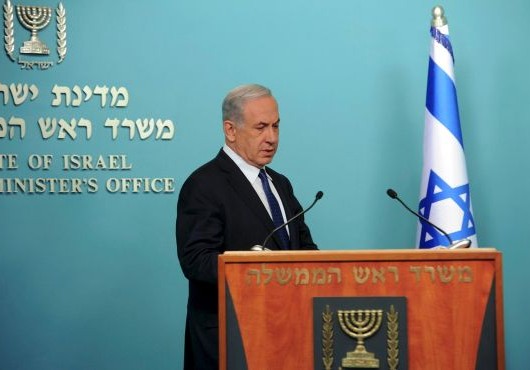
By Barak Ravid | Apr. 12, 2015 | 12:30 AM |
Prime Minister Benjamin Netanyahu said at a recent meeting of the security cabinet that if a comprehensive nuclear agreement between Iran and the six world powers is indeed signed by the June 30 deadline, the greatest concern is that Tehran will fully implement it without violations, two senior Israeli officials said.
The meeting of the security cabinet was called on short notice on April 3, a few hours before the Passover seder. The evening before, Iran and the six powers had announced at Lausanne, Switzerland that they had reached a framework agreement on Iran’s nuclear program and that negotiations over a comprehensive agreement would continue until June 30.
The security cabinet meeting was called after a harsh phone call between Netanyahu and U.S. President Barack Obama over the agreement with Tehran.
The two senior Israeli officials, who are familiar with the details of the meeting but asked to remain anonymous, said a good deal of the three-hour meeting was spent on ministers “letting off steam” over the nuclear deal and the way that the U.S. conducted itself in the negotiations with Iran.
According to the two senior officials, Netanyahu said during the meeting that he feared that the “Iranians will keep to every letter in the agreement if indeed one is signed at the end of June.”
One official said: “Netanyahu said at the meeting that it would be impossible to catch the Iranians cheating simply because they will not break the agreement.”
Netanyahu also told the ministers that in 10 to 15 years, when the main clauses of the agreement expire, most of the sanctions will be lifted and the Iranians will show that they met all their obligations. They will then receive a “kashrut certificate” from the international community, which will see Iran as a “normal” country from which there is nothing to fear.
Under such circumstances, the prime minister said, it will be very difficult if not impossible to persuade the world powers to keep up their monitoring of Iran’s nuclear program, not to mention imposing new sanctions if concerns arise that Iran has gone back to developing a secret nuclear program for military purposes.
It was decided during the security cabinet meeting to try to persuade the Obama administration to improve the agreement. However, Netanyahu and most of the ministers agreed that the only way to stop the agreement, even if it was unlikely to succeed, was through Congress. Thus, a good deal of Israeli efforts will focus on convincing members of Congress to vote for the Iran Nuclear Review Act, proposed by the Republican chairman of the Senate Foreign Relations Committee, Senator Bob Corker, that could delay implementation of a deal if one is reached.
Corker’s bill calls for a 60-day delay in implementing any signed nuclear deal, during which time Congress would scrutinize all the agreement’s details. The bill requires senior administration officials to provide Congress with detailed reports on the deal as well as attend Congressional hearings on the subject. Corker’s bill also states that American sanctions that were imposed by law would only be lifted if within the 60 days allotted for scrutiny of the agreement, the Senate Foreign Relations Committee and the House Committee on Foreign Affairs declared their support for the pact.
The Senate Foreign Relations Committee is to meet Tuesday for its first vote on the Corker bill, after which it will be voted on by the entire Senate. The White House is opposed to the bill and is threatening to veto it. At this point, in addition to all 54 Republican senators, nine Democratic senators have also expressed their support for the bill, leaving it four Democratic senators short, so far, of the 67-vote majority that would make the bill veto-proof.
The pro-Israeli lobby AIPAC, which coordinates its activities with the Israeli embassy in Washington and the prime minister’s bureau in Jerusalem, has begun over the past few days to exert pressure on Democratic senators – both publicly and privately – to get them to vote for the Corker bill.
AIPAC also claimed over the weekend on its official Twitter account that the framework of the current agreement would make it possible for Iran to become a threshold nuclear state within 15 years and therefore pressure should be brought to bear on Congress to vote for the Corker bill.
Netanyahu and Israel’s ambassador to Washington, Ron Dermer, want to see changes inserted in the bill that will make it more binding, and even turn it into one that prevents an agreement with Tehran rather than delaying it.
One change Netanyahu is seeking is a new clause that the deal with Iran be considered a treaty; an international treaty signed by the United States must be approved by a two-thirds majority in the Senate.
The Republican senator from Wisconsin, Ron Johnson, reportedly intends to demand at Tuesday’s meeting of the Senate Foreign Relations Committee that this clause be added to the bill.